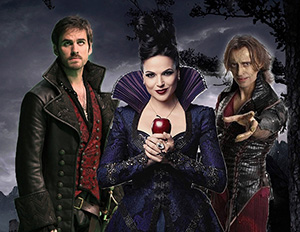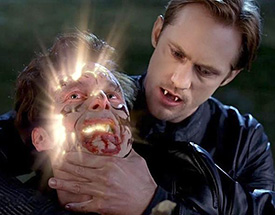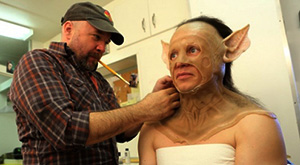
 Funny how things nag at you sometimes, isn’t it? How some ideas, initially little more than the flash of a fin above the surface of the conscious mind, gradually gain heft and end up looming ever larger. Other things stick to them, and soon you seem them everywhere you look.
Funny how things nag at you sometimes, isn’t it? How some ideas, initially little more than the flash of a fin above the surface of the conscious mind, gradually gain heft and end up looming ever larger. Other things stick to them, and soon you seem them everywhere you look.
As, for example, Monsters.
Beneath every bed under which I’ve peered nervously. Hulking behind every open door, breathing heavily. Waiting, claws twitching, amongst the old coats at the back of every cupboard.
Because, as everybody knows, that’s what Monsters do, right? Lurk just round the corner of the eye, waiting to leap out and get us when we’re not paying attention. Disney’s excellent animations notwithstanding, we probably shouldn’t be fooled into thinking that just because we know they’re there we have it all under control.
The number of hit U.S. (particularly, but not exclusively) TV serials featuring Monsters of one sort or another does not strike me as in any way reassuring. Grimm, True Blood, Vampire Diaries, Being Human, Dexter, Hannibal, Once Upon a Time….and those are just the prime-time ones I can think of right now. Never mind the films…
Don’t get me wrong, I’m a big fan of several of these shows, but that doesn’t stop this thing nagging at me. For what turns out, on examination, to be a whole tangle of reasons.
For a storyteller, any film or TV serial that attempts to traverse such traditional territory is always going to be equivocal, no matter how good it is (and some of them are very, very good indeed). These things matter a lot to me – I think they should to you too, but that’s for another time – but I accept that I’m in a tiny minority here, so beyond registering my deep misgivings about the subtle (and not so-subtle) ways we’re collectively altering some very old narratives, I’m putting my storyteller hat back on the hook.
The point I’m after here is a much more general one about Monsters. Their habits, habitat, how we deal with them…and why we might need them.
We all know that the way you deal with a Monster is to drag it out from under the bed, open the door, turn on the light…whereupon the Monster is revealed for what it is; a shadow, a figment of our overactive imaginations. The giant shrinks to the size of a doll and it turns out that that weird shadow really was your coat hanging oddly off the chair, not a ravening wolf poised to devour you.
You’d think, therefore, that the films and TV series are a good thing, helping us all to collectively banish some very scarey Monsters forever. Possibly, but I’m not convinced.
 The place where Monsters really live is in our imagination, and they draw all their power from us, using our imaginations we simultaneously thrill and frighten ourselves. Words on a page, even illustrations (if they’re good), still leave plenty of room for our imaginations to play, but as soon as we see something on a screen (large or small) the imagination largely shuts down. It’s not needed anymore, we’re being shown stuff instead.
The place where Monsters really live is in our imagination, and they draw all their power from us, using our imaginations we simultaneously thrill and frighten ourselves. Words on a page, even illustrations (if they’re good), still leave plenty of room for our imaginations to play, but as soon as we see something on a screen (large or small) the imagination largely shuts down. It’s not needed anymore, we’re being shown stuff instead.
There’s very few TV or film directors can resist the temptation to let us get a good look at the creature – eventually. They might put it off, play with us, but we know in the end we’ll get to see it. They’ve spent loads of money on it (or want us to think so), of course we’re going to see it in the end. As soon as we’ve seen it, though, it’s not a Monster anymore – we might still be scared of it, in the same way we’d be scared of a dangerous wild animal, but it’s not a Monster anymore.
So far, so good, but I think there’s a lot more going on, much of which is problematic. Quite apart from the lack of room for the viewer’s imagination – a bad thing because imagination, like any other ability we posses, needs regular practice to develop properly – I would argue that the implicit knowledge that we’ll eventually get a good look at the Monster changes our relationship with it to the extent that it’s now actually not a real Monster at all. Not in the psychologically important sense that I’ve been talking about.
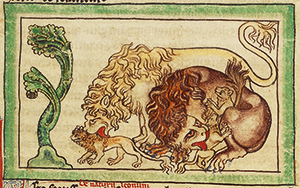 One of the key qualities of the traditional Monster is that sense of in-definition. In the moment of beating it we see it transformed into something else, something less threatening but – and this is the crucial thing – we are aware of that transformation at some level, and we believe that up until that moment it really, truly was a Monster. One way of thinking about this is as a power transfer. In exposing it, we transfer the Monster’s power to ourselves, gaining the stature to defeat it.
One of the key qualities of the traditional Monster is that sense of in-definition. In the moment of beating it we see it transformed into something else, something less threatening but – and this is the crucial thing – we are aware of that transformation at some level, and we believe that up until that moment it really, truly was a Monster. One way of thinking about this is as a power transfer. In exposing it, we transfer the Monster’s power to ourselves, gaining the stature to defeat it.
The screen monsters almost always lack that transformative moment, and that, plus the knowledge of the ultimate ‘reveal’, plus the overwhelming power of the moving image all combine to produce a different effect. All appearances to the contrary, these are not Monsters in the old sense; more like obscure, previously un-documented breeds of wild animals. Still dangerous, but lacking some important dimensions.
The wild animal analogy points up another potential problem – that of pinning things down.
It’s all too easy for your favorite screen version of a particular thing to become your personal template for that creature. Again, the imagination is taking a hit, but there’s also that feeling of power that we get from the sense of having classified something. We have our defining specimen, neatly pinned down, so we know all about it. It’s in our natures to conflate ‘explaining something’ with ‘explaining it away’.
You only have to watch a few episodes of Dexter or Hannibal, or any of the myriad serial killer (the Monster that hides in plain sight) films to begin to appreciate what an insidious trap this is. There’s almost always an ‘expert’ of one sort or another, explaining the monster away. Part of the process of defeating the monster becomes a purely intellectual exercise, often presented as a puzzle, the solving of which unlocks the explanation. In Dexter and Hannibal the monster has become his own expert, and is allowed to try and persuade you to see the world through their eyes, the ultimate ‘explaining away’ as it implicitly denies there was anything there to explain in the first place.
The real Monsters exist within us, they are the Monstrous parts of ourselves. We all need to understand this, acknowledge that each and every one of us has within us the potential to behave truly Monstrously. It would be stupid not to be at least a little afraid of this.
Viewed from this angle, the traditional Monster stories fairly obviously serve (amongst other things) a very practical purpose. They allow us to partially externalize the Monster, by exercising our imaginations (which at the same time implicitly acknowledges where the Monster comes from in the first place) helping us to understand
- a) that they exist and
- b) it’s proper and sensible to be afraid of them and that
- c)despite our fear, we can beat them.
The human psyche being the subtle and tricky thing it is, we simply don’t have the same emotional relationship with screen monsters as we do with our own, imagined, internal Monsters – because they’re not really part of us in the same direct way. It may be very entertaining to see them dragged, kicking and screaming (or strutting proudly, in some cases) out into the cold glare of the studio lights, there to be beaten, but it’s really not the same emotionally as each of us experiencing the vanquishing of our very own Monsters.
That’s the real problem.
Partly because most of us are lazy, so it’s frighteningly easy to persuade us that vicariously participating in something via the screen is emotionally/morally equivalent to doing it for ourselves. Someone else has done it on our behalf, and we’ve somehow participated because we watched them do it. A moment’s reflection should be all that’s needed to realise that this is patently absurd, might even make it harder for us to do the necessary ourselves.
The other part of the problem, though, is even more insidious. This false equivalence is giving rise to a seriously worrying drift towards a general world-view which says that we should now be able to quantify and manage all possible risks.
This is, I believe, dangerous nonsense.
Amongst many other woes, it’s now widely accepted that it was thinking like this that was primarily responsible for the financial crash in 2008.
If you’re wondering how we’ve suddenly leapt from screen monsters to financial crises, just try thinking about it like this:
A whole bunch of very bright people, spurred on by overweening Pride (and socially Lionized) allowed themselves to be wholly devoured by Greed, to the extent that eventually they became pretty much hollow…so that when something went wrong, they just collapsed, and very, very nearly took the entire economy of the Western World with them.
An emotionally loaded, probably unfair way of putting it, you might think. Bear with me.
In other words, people in positions of great power truly became Monsters (sound familiar?) and hardly anyone noticed – until the little disaster, the small crack that rapidly propagated until the whole edifice shattered.
If this way of thinking about such supposedly hard-nosed stuff as finance seems far-fetched, consider this:
However you explain the mechanisms behind the crash, one of the things that one hears a lot voiced as a defense, why we didn’t spot it coming etc., was that the small things that set it off (whatever the specifics might have been) arose out of hugely unlikely combinations of circumstances.
But any one who knows anything about statistics will tell you that the million-to-one against catastrophe must, eventually, happen. More, that the calculated odds against an event occurring tell us nothing at all about when it will happen. Not a thing. We just know that at some point it is inevitable.
This is weirdly un-intuitive for most people, hardly any of us seem to have brains wired to give us anything like a decent level of intuition when it comes to risk and probability. The best that even the most talented in this respect can manage seems to be a knack for certain forms of gambling – poker being the most obvious example. (Or perhaps we do, but we don’t give ourselves enough credit – most of us will have heard of ‘sod’s law’, which broadly says that if it can go wrong, it will, and in the most inconvenient way possible.)
The moment we start thinking in terms of Monsters, though, we start telling ourselves stories. Then anybody that’s familiar with how stories work (many children, for example) will immediately intuit that the unlikely, un-looked for catastrophe not only will happen, it has to happen, otherwise the story doesn’t work.
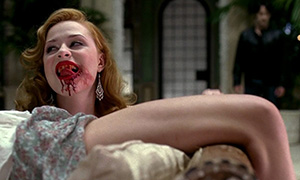 Strip away all the complex maths, political obfuscation and financial jargon, and you’re left with people. People who can become Monsters, but have convinced themselves instead that the monsters are all external, and that they have the statistical, risk-management tools to tame them. People, also, who seem to have forgotten how stories work.
Strip away all the complex maths, political obfuscation and financial jargon, and you’re left with people. People who can become Monsters, but have convinced themselves instead that the monsters are all external, and that they have the statistical, risk-management tools to tame them. People, also, who seem to have forgotten how stories work.
Put like that, it pretty much becomes inevitable that something will go horribly, horribly wrong.
If the leap from Grimm to Wall Street seems too huge for you, then try this one instead.
What happens when it becomes publicly known that a well-known TV presenter may have been behaving Monstrously for years and years, aided and abetted (or at least not exposed) by his employers and others in (for want of a better phrase) ‘the establishment’ ?
The few voices calling for restraint and balance are swamped by a media-generated storm of hysterical speculation and nonsense.
Some Monsters have grown so large in our collective imaginations that we find ourselves completely swallowed in their shadows. The kind of sensible, reasoned public debate that might conceivably yield insight and advance has become more or less impossible. By allowing this, we all become victims. As a society, we are loosing our capacity to deal with some of these things.
Despite all the well-documented evidence to the contrary, enough of us believe that our children are being stalked by knife-wielding, homicidal maniacs, and that it’s getting worse, that we insist on driving them to and from school. Directly contributing to significant increases in air pollution and traffic congestion. Even though this particular myth has been widely, publicly exposed, there’s very little sign of any changes in our behavior. We’d all rather believe in the Monsters, because it makes emotional sense, whatever the facts may say.
Just two examples of the way we collectively think and feel about these things has become seriously unbalanced, a brief scan of any newspaper or news report will, I strongly suspect, surely yield more instances.
If the old stories have anything to teach us in this context, one of the most obvious things is that we’ve always made Monsters – and that the stories themselves stand as evidence of a socially evolved strategy for dealing with them. They help us to understand what they are, where they come from and how we can deal with them.
Impossible to say, of course, how successful this strategy has been in the past.
At present, though, I believe there’s an increasingly compelling body of evidence – the current fad for screen monsters simply being one of the more visible manifestations – to suggest that profound changes in some very fundamental attitudes and understandings are taking place. The current obsession with risk-management and externalizing, classifying and cataloging threats seems to have rendered us temporarily incapable of other modes of thought and discourse.
I think we’re loosing our ability to distinguish between the real Monsters and the chimera created by panic-mongering media. We’re also loosing the ability to confidently diagnose the Monsters within us, and deal with them appropriately.
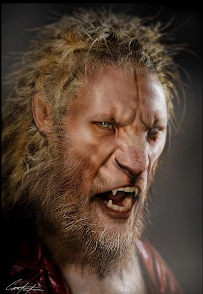 We’re in danger of believing the ultimately comfortable fables the screen monsters are telling us. Forgetting that after the movie, after we turn the telly or the lap-top off, there might still be something lurking just beyond the edges of our vision, something waiting for us behind the door. Something lurking in the darker corners of ourselves that is striving for expression.
We’re in danger of believing the ultimately comfortable fables the screen monsters are telling us. Forgetting that after the movie, after we turn the telly or the lap-top off, there might still be something lurking just beyond the edges of our vision, something waiting for us behind the door. Something lurking in the darker corners of ourselves that is striving for expression.
If we’ve forgotten how to tell the difference between the real and manufactured, forgotten what we should really be afraid of, forgotten how to deal with our Monsters, then we could really be in trouble.
This hasn’t led me anywhere near where I thought it would at the outset, and there’s quite a bit more I’d like to discuss, but I’ve just heard an odd noise upstairs, so I’ll see you later…hopefully.
If anybody’s passing, you might do me a favour and just knock on the door…you know, just to check.
Well, you never know, do you?
